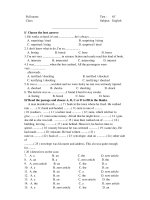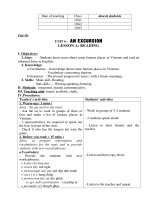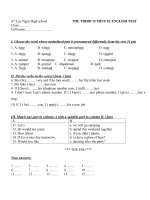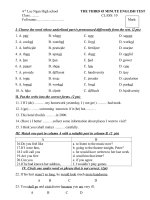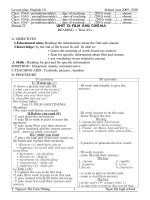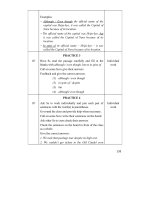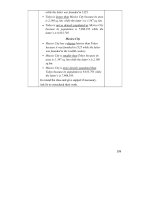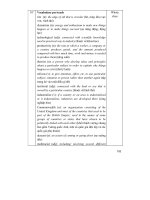Tiếng anh 10: Bài giảng review 3 skills
Bạn đang xem bản rút gọn của tài liệu. Xem và tải ngay bản đầy đủ của tài liệu tại đây (425.08 KB, 4 trang )
REVIEW 3 (UNIT 6 – 7 – 8)
Lesson: SKILLS
Môn: Tiếng Anh 10 chương trình mới
Cô giáo: Hoàng Xuân
Reading
Activity 1. Read the text.
Tạm dịch bài đọc:
Bảng (trắng) tương tác
Một bảng tương tác là một thiết bị điện tử mà giúp học sinh học tiếng Anh bằng những cách kích thích hơn.
Nó rất hữu ích trong lớp học bởi vì nó có thể khuyến khích học sinh và đem đến cho chúng những cơ hội
tương tác. Bạn có thể viết lẽn nó với một cây bút đặc biệt hoặc thậm chí với ngón tay của bạn. Bạn cũng có
thể chạy phần mềm thuyết trình trên bảng tương tác. Nó hữu ích cho giáo viên để làm thuyết trinh ngữ pháp
và từ vựng và lưu chúng để sử dụng lại. Sau khi học sinh hoàn thành bài tập chúng có thể xem những câu trả
lời đúng trên mạng. Giáo viên cũng có thể tải những nguồn như là bài tập điền vào chỗ trống, câu hỏi trắc
nghiệm hoặc trò chơi cho học sinh làm trong lớp. Tất cả những gì học sinh phải làm là lên bảng, kéo và thả
câu trả lời của chúng vào khoảng trống bằng tay. Điều này đòi hỏi chúng trực tiếp thao tác ở trước bảng, mà
hầu hết chúng đều thích. Nói tóm lại, một bảng tương tác đều có lợi cho cả giáo viên và học sinh trong lớp
học.
b. Match the words in A with their definitions in B.
1 Truy cập trang để học Toán – Lý – Hóa – Sinh – Văn – Anh – Sử
- Địa – GDCD tốt nhất!
Gợi ý:
1–d
2–c
3–b
4–a
Activity 2. Read the text again and answer the questions.
Gợi ý:
1. It helps students learn English in a more stimulating way.
2. Because it can engage students and provide them with interactive opportunities.
3. Because with it teachers can make grammar or vocabulary presentations and save them for using again.
4. They can download gap-fill exercises, multiple-choice quizzes or games.
5. They can drag and drop their answers into the gaps with their fingers.
Speaking
Activity 3. Work in groups. Read about different customs in four countries. Then discuss the
questions below.
2 Truy cập trang để học Toán – Lý – Hóa – Sinh – Văn – Anh – Sử
- Địa – GDCD tốt nhất!
Gợi ý:
1. Yes. People should arrive early if they are invited to someone’s house.
2. Because our grandparent and parents taught us this. And we also read about it in books.
3. On the New Year Days, people don’t sweep the floor because they believe that it make the luck go out.
Listening
Activity 4. Listen to a recording about meeting and greeting customs in some countries around the
world. Decide whether the following statements are true (T) or false (F).
Gợi ý:
1. F
2. T
3. F
4. F
5. T
6. F
Audio Script:
In countries around the world, people meet and greet each other in different ways:
In Finland, people greet each other with a handshake. Close friends and family members often hug and kiss
when they meet.
3 Truy cập trang để học Toán – Lý – Hóa – Sinh – Văn – Anh – Sử
- Địa – GDCD tốt nhất!
In Japan, people usually bow when greeting each other. When greeting family or friends, a small head bow
is used. But when greeting a superior, people are expected to use a deeper, longer bow to show respect.
In Korea, when men greet each other, they bow and shake hands. But women do not often shake hands. Like
in Viet Nam, when you address someone with his or her full name, the family name come first, then the first
name.
In the United States, when people meet each other for the first time, they shake hands. Hugging and kissing
are best left for friends and family members in informal situations. In these cases, men usually kiss women,
but men kissing other men is not common.
Writing
Activity 5. Write about what customs a visitor to Viet Nam should know. Use the following points or
your own ideas.
There are some dos and don’ts that you need to know when you visit Vietnam. For example, when you plan
to visit someone at home, remember to call them first to see wether they are at home or not. Also, when you
plan to meet someone, try to arrive at the meeting on time. Puntuality is appreciated here in Vietnam.
Besides, when you buy things in open-air markets, bargaining with shop-keepers will help you get better
prices.
There are also things you shouldn’t do, too. For instance, taking photograph in pagodas or temples is not
appropriate because those places are holy ones. Also, when you are given a gift, avoid opening it in front of
the giver. Besides, people in Vietnam do not kiss friends on the cheeks when they meet, so remember not to
do that when you meet a Vietnamese friend.
4 Truy cập trang để học Toán – Lý – Hóa – Sinh – Văn – Anh – Sử
- Địa – GDCD tốt nhất!
